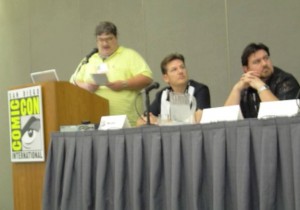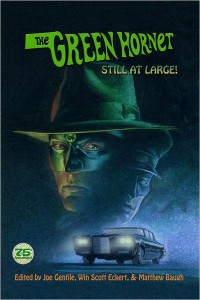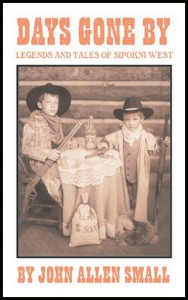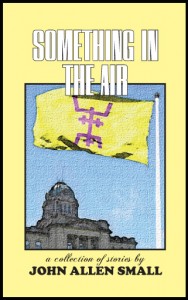Editor’s Note: This post is the second in a series that will feature former students of mine who have become professional writers. I asked each of them to focus on the topic, “Why I Write.” Today’s post features my friend and former student, John Small, whom I met during my early years of teaching at Olivet Nazarene University in the mid-1980s. I taught journalism and literature and advised the student newspaper. John was editor-in-chief of the paper and did excellent work. He has continued to thrive as a journalist ever since. (To see the first post in this series, by Dr. Michael Clark, scroll down or click here.)
Greetings. My name is John Small; I am the news editor and columnist for the Johnston County Capital-Democrat, a weekly small town news paper headquartered in Tishomingo, Oklahoma. I met Joe Bentz while were were both at Olivet Nazarene University; age-wise we are contemporaries, but I was the student and he was my college advisor and journalism professor and I worked with him at the campus newspaper, the GlimmerGlass. We both left the same year as I recall, he to take his job at Azusa Pacific and I to take the job here. Always makes me think there was a reason we were both there at the same time, but I suppose that’s a topic for another time…
WHY I WRITE
by John Small
It occurs to me that there is no one easy answer to that question.
I’ve been writing for as long as I can remember. I was fortunate enough to have parents who both love to read, and they saw to it that I earned to read as a much younger age than the other kids my age. My mother claims my love of writing stems from that; the story she likes to tell is that I started writing my own stuff because we ran out of things at the house for me to read. That certainly sounds like something I would have done.
My late younger brother Jimmy always said I took up writing as a defense mechanism. When you’re the lone bookworm in a class overflowing with jocks and jerks you tend to get picked on a lot – but the picking lessens considerably when they realize you’re the only one who can help them with their term papers.
My wife Melissa likes to say I became a writer to get her attention. That’s not entirely true, as I was writing long before I met her; on the other hand, why argue with success.
My own feeling is that I became a writer because, A.) I didn’t know how to do anything else; and B.) and this was the best way I could think of to make some kind of a mark on this world during my short time here. So I set out to become as muIti-faceted a writer as possible.
I became a journalist because I like getting to the truth of things and sharing that information with the world around me. Journalism is more than covering politics or crime or celebrities or sports, though heaven knows I’ve done my share of all of these. It’s also being there for the chili supper fund-raiser and the ribbon cutting for the new hamburger stand and the local girl raised by an adoptive family who is just meeting her birth mother for the first time. There’s an old saying, “Journalism is history’s first draft.” But history is more than the “big stories” kids will read about in the history books 100 years from now; it’s also the little things that were going on during that period, the births and deaths and weddings and the kid who finally made the honor roll. Those things are a part of our history, too, and I enjoy being one of those who shares those stories with the community.
I became a columnist because sometimes I feel like I need to say something about some of those news stories going on in the world, and I know that the news stories I write is not the appropriate place to do so. I also like sharing the occasional anecdotes about my wife and sons, or to review new books or movies or recordings, or sometimes just share a silly story or two. My weekly column covers a lot of territory and I think that’s why I get the positive responses to it I always have; people never know what I’m going to talk about next.
I became a fiction writer because I enjoy the creative process, and because I need an outlet for this somewhat warped imagination my parents saw fit to bequeath to me. To date I’ve published two short story collections of my own and have been included in three fiction anthologies. That’s been a great deal of fun on a number of levels, from taking part in book signings to hanging out with other writers and getting to speak at functions like the San Diego Comic-Con and PulpFest. I’ll never get rich doing it but if I were doing it for the money I’d be doing it for the wrong reasons…
I’ve published two short story collections of my own and have been included in three fiction anthologies. That’s been a great deal of fun on a number of levels, from taking part in book signings to hanging out with other writers and getting to speak at functions like the San Diego Comic-Con and PulpFest. I’ll never get rich doing it but if I were doing it for the money I’d be doing it for the wrong reasons…
In looking back over the preceding paragraphs it occurs to me that I may have rambled on at length without actually answering the question at hand.
Why do I write?
Because I can. And because I love it.

Comments 6
I think it’s true that children who are raised to love reading and who learn to read at an early age are more prone to write.
I grew up in a family of eight. We were home-schooled and we all learned very early in life how to read. Our entire basement was a library with books that had been collected at book sales. Even though I have never written anything (except college papers) which has been viewed, I still love to write.
I remember a computer program that we had that helped us practice our math. Before you could do the exercises, you had to write your name in an entry. Because I was too young to realize that there were programs you could use to write (and because it was a Commodore 64), I would write stories in the “name” entry of the math program.
I even tried to teach my older brother how to write stories. I told him that you had to think of a character, and then you just made stories up about that character.
Although I have no desire to ever become a professional writer, I will continue to write for myself and for the love of writing. I think it satisfies a deep seated creative urge that is in every single one of us.
Interesting post. Your final statement of “Why do I write?
Because I can. And because I love it,” brings to mind Emily Dickinson. To write because one can and one loves it, and is compelled to–whether their pieces are ever seen by the world or not–is an incredible thing. Didn’t she write over 1,700 poems, and publish less than a dozen in her lifetime?
I remember Dr. Bentz saying something along those lines.
It is good to hear that you have found your niche in all of humanity by contributing to the world largely through writing. Well done!
I found your comments on writing to be very insightful. In this day and age, it is rare to find people who enjoy writing just for the sake of writing. As a college student, I’ve noticed that many of my peers detest reading and writing, skills which are sadly becoming less appreciated in our technology dominated society.
I, however, find myself writing frequently, not just for academic purposes but also for personal reasons. I started writing poetry shortly after high school. Although I was encouraged by a few colleagues to attempt publishing, I realized the reason for my scribbles: writing is therapeutic. I find that writing allows me to express my thoughts and feelings to an unknown, non-judgmental audience. I can rearrange my words and thoughts and take back that which I regret with one stroke of the eraser. Or if I’m feeling particularly uncivil, I can say whatever I like without fear of offense. All in all, I find that writing is meditative and, as I said, therapeutic. Why do I write? For relaxation and clarity.
Pingback: Five of the Eighteen Reasons I Write (by William J. Torgerson) | Life of the Mind and Soul
I loved this post for so many reasons. I selfishly love it because I too enjoy journalism as well as literature, but also because I think it is important as writers to explore why we write. I really like the idea that Small pointed to–that he possibly began to write as a defense mechanism. I think this is a reason many writers first seek out the pen and page. As writers, especially writers of fiction, I think that we use the craft as more than escapism, but often a way of survival. What better way to pursue our greatest fears and most outlandish dreams than to explore them in the safety of fiction where we control the ending?
I’ve actually had this prompt assigned by two of my favorite professors at APU, in addition to my grandparents consistently asking more detailed questions like, “Why do you write…such dark things/about death/unhappy topics (or my grandmother’s favorite–is this about me?)” In many ways, my answer is the same as Small’s: because I love it. But I would be lying if I didn’t also say because I’m a control freak, because I’d rather live in fiction, because I’m afraid of what the real world holds, because it’s a method of surviving the real world, because every word we use means something, to me, to someone, because I feel powerful.
As writers, we should never stop asking this question. As a fiction writer, I think that it is easy to become selfish in our focus on the fictitious. So I revise my reasons, just a bit, to include–because writing changes lives, because it provides hope, because it gives us a save place to go to, because it can give us a home.
This semester I got to experience journalism for the first time in a class and I have to say that I was taken back at how interesting this type of writing is. I admire journalism and what it has to offer and I particularly like your post for those reasons. And yes most of us simply write because we can and because we love it. But I think that writing also helps one grow, grow in a very private kind of way and it is something as intimate as writing that stirs talent such as yours and other writers I have studied at school. I agree with Chelsea’s statement, that one should never stop asking this questions- it is the questions that will change at times but at the core it remains the same… because I can.